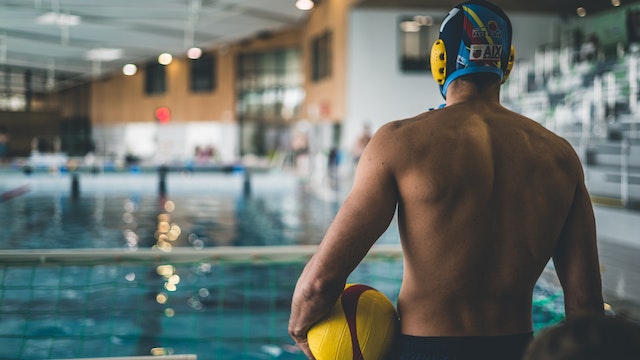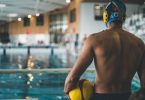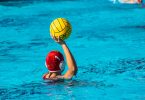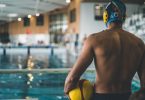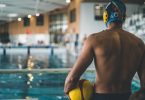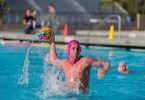Have you ever wondered if weighing more helps in water polo? It’s a common question among players and spectators alike. Some believe that having more weight can help players stay afloat and be more powerful in the water, while others argue that being lighter and more agile is the key to success in this fast-paced sport.
In this article, we will explore the science behind weight and water polo, and whether or not weighing more actually helps water polo players perform better. So, let’s dive in and find out if being heavier is really an advantage in water polo, or if it’s just a myth.
Firstly, your weight affects your buoyancy in the water. Generally, the more body fat you have, the more buoyant you are, which can make it easier to stay afloat and move around in the water.
On the other hand, having more muscle mass can make you heavier, which can make it harder to stay afloat, but can also give you more power and strength when swimming and shooting.
It’s also worth noting that water polo is a sport where height and reach can be advantageous. Taller players with longer arms can reach higher and further, making it easier to block shots and pass the ball.
However, being shorter and lighter can also have its advantages, such as being able to move more quickly and change direction more easily.
The Role of Weight in Water Polo
Weight plays a significant role in water polo. It affects a player’s performance in the game, and it is essential to understand how it affects the gameplay. In this section, we will discuss the physics of water polo and the importance of speed and agility in the game.
The Physics of Water Polo
The physics of water polo is unique because the game is played in water. The water’s buoyancy affects a player’s weight, making them feel lighter in the water. However, the water’s resistance also makes it harder to move and change direction quickly. Therefore, a player’s weight can affect their ability to move and position themselves in the water.
According to Quora, weighing more does not necessarily help in water polo. It is more about game awareness than straight-line speed. However, having some weight can be an advantage as it can add to buoyancy in the water, making it easier to move around.
The Importance of Speed and Agility
Speed and agility are crucial in water polo. Players need to be quick and agile to move around the pool, avoid defenders, and position themselves to take a shot or pass the ball.
Therefore, having a lower body weight can be an advantage as it can help players move around the pool faster and change direction quickly.
According to Stay Little Harbor, lifting weights can help water polo players develop explosive speed and agility, which are essential for success in the game. However, players should focus on improving strength and power on land and then learn how to incorporate it into water polo specific actions.
Overall, weight plays a significant role in water polo, but it is not the only factor that affects a player’s performance. Players need to have a balance of strength, speed, and agility to succeed in the game.
The Pros and Cons of Weighing More in Water Polo
Advantages of Weighing More
If you are a heavier player, you may have an advantage in water polo. One advantage is that you may be able to hold your position better against lighter players. You can also use your weight to help you push off the bottom of the pool and get a better jump on the ball.
Another advantage of weighing more is that you may be able to absorb more physical contact from other players. This can be especially helpful when playing defense or trying to take the ball away from an opponent.
Additionally, if you are a heavier player, you may have a higher level of endurance. This is because you have more muscle mass, which can help you maintain your energy levels throughout the game.
Disadvantages of Weighing More
While there are some advantages to weighing more in water polo, there are also some disadvantages. One disadvantage is that you may not be able to move as quickly in the water. This can make it harder for you to keep up with lighter, faster players.
Another disadvantage is that you may tire more quickly. This is because your body has to work harder to move your weight through the water. If you are not in good physical condition, this can be a significant disadvantage.
Finally, if you are a heavier player, you may be more prone to injury. This is because your body has to absorb more force when you hit the water or another player. If you are not careful, you could end up with a serious injury that could sideline you for the rest of the season.
Overall, there are both advantages and disadvantages to weighing more in water polo. It is important to consider these factors when deciding how to approach the game. By understanding the pros and cons of weighing more, you can make informed decisions that will help you be a better player.
Training Strategies for Water Polo Players
If you want to improve your performance in water polo, you need to focus on your training strategies. This section will cover three essential areas of training: strength training, endurance training, and nutrition. By following these strategies, you can become a stronger, faster, and more skilled water polo player.
Strength Training
Strength training is crucial for water polo players. It can help you improve your overall strength, power, and explosiveness in the water. Some of the best strength training exercises for water polo players include bench press, full squat, and countermovement jump.
When designing your strength training program, it’s essential to focus on compound exercises that work multiple muscle groups simultaneously. You should also incorporate exercises that mimic the movements you use in water polo, such as throwing and swimming.
Remember to start with lighter weights and gradually increase your weight as you build strength. It’s also crucial to allow your body to rest and recover between workouts to avoid injury.
Endurance Training
Endurance training is essential for water polo players because it can help you maintain your stamina and energy during long games. Some of the best endurance training exercises for water polo players include swimming laps, treading water, and interval training.
When designing your endurance training program, it’s essential to focus on exercises that mimic the intensity and duration of a water polo game. You should also incorporate interval training to improve your ability to recover quickly between plays.
Remember to start with shorter workouts and gradually increase your workout duration and intensity as you build endurance. It’s also crucial to allow your body to rest and recover between workouts to avoid injury.
Nutrition
Nutrition is crucial for water polo players because it can help you fuel your body for intense workouts and games. Some of the best foods for water polo players include lean protein, complex carbohydrates, and healthy fats.
When planning your meals, it’s essential to focus on nutrient-dense foods that provide a balance of macronutrients and micronutrients. You should also aim to eat a balanced meal or snack within 30 minutes after a workout to help your body recover and rebuild.
Remember to stay hydrated by drinking plenty of water throughout the day and during workouts. You should also avoid sugary drinks and processed foods, which can lead to energy crashes and poor performance.
Conclusion
So, does weighing more helps in water polo? It’s a bit of a complicated answer. While having more weight can give you an advantage in certain situations, such as when trying to hold your position against an opponent, it’s not necessarily the deciding factor in winning a game.
Other factors, such as speed, reaction time, and endurance, are just as important, if not more so, in determining who comes out on top. Additionally, being too heavy can actually be a disadvantage, as it can slow you down and make it harder to move quickly in the water.
Ultimately, the key to success in water polo is to develop a well-rounded set of skills and abilities, including strength, speed, and agility, while also working on your strategy and teamwork with your fellow players. By focusing on all of these areas, you’ll be better equipped to handle any situation that comes your way and come out on top in the pool.

